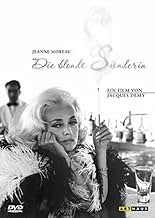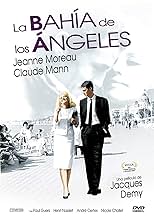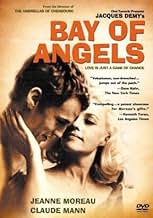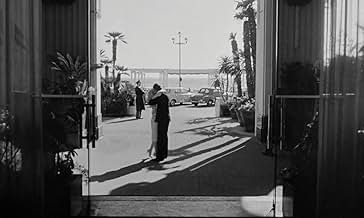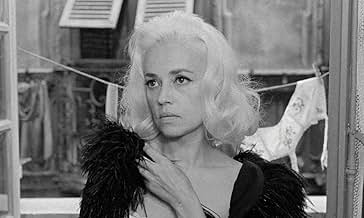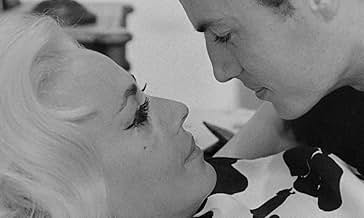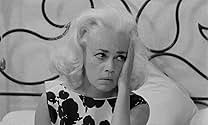VALUTAZIONE IMDb
7,2/10
4527
LA TUA VALUTAZIONE
Aggiungi una trama nella tua linguaJean is a clerk in a bank. His colleague Caron is a gambler and gives him the virus. In the casinos, Jean meets Jackie. Their love affair will follow their luck at the roulette.Jean is a clerk in a bank. His colleague Caron is a gambler and gives him the virus. In the casinos, Jean meets Jackie. Their love affair will follow their luck at the roulette.Jean is a clerk in a bank. His colleague Caron is a gambler and gives him the virus. In the casinos, Jean meets Jackie. Their love affair will follow their luck at the roulette.
- Regia
- Sceneggiatura
- Star
- Premi
- 1 vittoria in totale
Recensioni in evidenza
Jean is a clerk in a bank. His colleague Caron is a gambler and gives him the virus. In the casinos, Jean meets Jackie. Their love affair will follow their luck at the roulette.
Jacques Demy was still early in his career at this point, having really only made one film, "Lola". He returns here to black and white and a non-musical, the second and last time he would do that. But he always told stories of love and this is no exception. (Some think he had his own take on Hollywood, but that is a whole other issue.)
Here gambling, especially roulette, is glamorized. At a time when gambling was run out of Cuba and was illegal basically everywhere in the United States besides Nevada, there is a sense of mystique about gambling that evokes thoughts of James Bond. This film captures that perfectly.
Jacques Demy was still early in his career at this point, having really only made one film, "Lola". He returns here to black and white and a non-musical, the second and last time he would do that. But he always told stories of love and this is no exception. (Some think he had his own take on Hollywood, but that is a whole other issue.)
Here gambling, especially roulette, is glamorized. At a time when gambling was run out of Cuba and was illegal basically everywhere in the United States besides Nevada, there is a sense of mystique about gambling that evokes thoughts of James Bond. This film captures that perfectly.
Jacques Demy's "Bay Of Angels" may be the best movie ever made about compulsive gambling, along with the appropriately titled "The Gambler" (1974). It's not "realistic" in its technicalities (winning three consecutive times by betting on a single roulette number happens ONLY in the movies), but I don't think it wants to be; what it's trying to get at is the psychology of gambling, and at that it succeeds (in fact, it shows two different "types" of players: the wetting-his-feet and the full addict). This movie, which offers a rare view of the high and low life in and around the Nice and Monte Carlo casinos circa 1963, has the immediacy and spontaneity that the French New Wave often strived for, minus any of the pretentiousness (just compare it with Godard's not dissimilar "Pierrot Le Fou"). Jeanne Moreau sports an iconic look and plays a daringly flawed female character; the much lesser-known internationally Claude Mann is also very good. It's a minor classic. ***1/2 out of 4.
Boy, take Demy away from musicals and he becomes one rather somber director, huh? In other words, I disagree with the previous reviewer, theognis 80821, who described this very bleak study of two chronic gamblers as "fun". In fact, it's so un fun that I sedulously did not buy the tacked on happy ending when Jeanne Moreau's walking ad for gamblers anonymous suddenly and inexplicably decides to renounce roulette for stolid Claude Mann (who may look like Belmondo but does not resemble his acting).
However, until that cloying last scene Demy does not hit a false note as he relentlessly chronicles the toll this insidious addiction takes on a woman of intelligence and sensitivity to the point where husband and child are tragically renounced for momentary highs at expensive and tawdry casinos. And Moreau's great performance ensures that you experience the full ugliness of it. Give it a B plus which would have been higher without that sappy ending and a different actor in the lead opposite Ms. Moreau.
However, until that cloying last scene Demy does not hit a false note as he relentlessly chronicles the toll this insidious addiction takes on a woman of intelligence and sensitivity to the point where husband and child are tragically renounced for momentary highs at expensive and tawdry casinos. And Moreau's great performance ensures that you experience the full ugliness of it. Give it a B plus which would have been higher without that sappy ending and a different actor in the lead opposite Ms. Moreau.
First a note of interest: Jeanne Moreau is in the movie, and she's the star, of course, but she's also a blonde here. Usually, from what I can remember from say The Lovers or La Notte or Jules & Jim it's dark or at least brunette. I wonder if she was already blonde at the time or if it was a deliberate and specific choice on director Jacques Demy's end. Because, somehow, it does add something extra to the character. When we first see her on screen she's being 'escorted' (kind word for kicked out) of a casino that Jean and Caron are at to start gambling, and it's a big scene where we see her arguing and stomping her feet and we barely see her face, just a fury of big blonde hair and attitude to match. It's not exactly the same cool presence one saw in some of Moreau's other big films of the period - and yet when we see her again she is lovely and with that face that charms immediately upon the smile, and makes one feel the gloom of after hours when looking serious.
Bay of Angels is a movie that works best when Demy focuses his theme on escapism, what would appear to be at first a film for escapists, about people going off to rich places like Monte Carlo and gambling away the life savings and having a great time in expensive suits and drinking champagne. But it's also about the nature of this escapism, the danger of it. It's predictable to see that Jean, who comes from a family where gambling is incredibly frowned upon, and Jackie, who at one point confesses that going into a casino is like going into Church, will lose a lot of money, maybe all of it, and keep going in dire straits throughout. What isn't expected is how Demy interweaves this seemingly endless back and forth of the bottomless pit that is a gambler's life (if only seeming like a lifetime in however few days Jean/Jackie are together) and how touching it becomes against the backdrop of glamour. At the least, his film is about something.
The only problems come with a few scenes in the script that drag - the dialog often works, but sometimes not quite enough to satisfy the emotional purpose of a scene. Maybe also contributing to this is first time actor Claude Mann as Jean. Mann would later be featured in Melville's Army of Shadows, among other notable films, but here he just can't hold his own most of the time alongside such a presence like Moreau. It was wise to cast someone young, and maybe not with the most experience, as this kid who goes on vacation from a small bank-clerk job to try and find himself by way of throwing away hundreds of thousands (albeit I pictured more-so, as the film went on, the actor who played the lead in Pickpocket). But Mann just doesn't really fit in, especially when he has to go into big dramatic scenes (i.e. the outbursts of anger against Jackie in the hotel rooms).
And yet Bay of Angels displays a director with an intuition with the camera, a grace and style, and a dazzling sense of music, precisely repetitive, over the shots of the roulette table spinning around and the faces dissolving in and out with it. There are beautiful moments, and it's hard not to take eyes ever off of Moreau, one of those actresses who keeps working today into her late 70s going on 80s but whom one thinks of in black and white only. She had/has one of the great faces in movies, and she's a damn good actress to boot. 7.5/10
Bay of Angels is a movie that works best when Demy focuses his theme on escapism, what would appear to be at first a film for escapists, about people going off to rich places like Monte Carlo and gambling away the life savings and having a great time in expensive suits and drinking champagne. But it's also about the nature of this escapism, the danger of it. It's predictable to see that Jean, who comes from a family where gambling is incredibly frowned upon, and Jackie, who at one point confesses that going into a casino is like going into Church, will lose a lot of money, maybe all of it, and keep going in dire straits throughout. What isn't expected is how Demy interweaves this seemingly endless back and forth of the bottomless pit that is a gambler's life (if only seeming like a lifetime in however few days Jean/Jackie are together) and how touching it becomes against the backdrop of glamour. At the least, his film is about something.
The only problems come with a few scenes in the script that drag - the dialog often works, but sometimes not quite enough to satisfy the emotional purpose of a scene. Maybe also contributing to this is first time actor Claude Mann as Jean. Mann would later be featured in Melville's Army of Shadows, among other notable films, but here he just can't hold his own most of the time alongside such a presence like Moreau. It was wise to cast someone young, and maybe not with the most experience, as this kid who goes on vacation from a small bank-clerk job to try and find himself by way of throwing away hundreds of thousands (albeit I pictured more-so, as the film went on, the actor who played the lead in Pickpocket). But Mann just doesn't really fit in, especially when he has to go into big dramatic scenes (i.e. the outbursts of anger against Jackie in the hotel rooms).
And yet Bay of Angels displays a director with an intuition with the camera, a grace and style, and a dazzling sense of music, precisely repetitive, over the shots of the roulette table spinning around and the faces dissolving in and out with it. There are beautiful moments, and it's hard not to take eyes ever off of Moreau, one of those actresses who keeps working today into her late 70s going on 80s but whom one thinks of in black and white only. She had/has one of the great faces in movies, and she's a damn good actress to boot. 7.5/10
Jacques Demy's second feature is an amazingly fluid, vibrant comedy about love and luck, starring Jeanne Moreau at her (dazzling) best. And she is literally dazzling, in resplendent costumes (mostly by Pierre Cardin) and radiantly blonde. The music by Michel Legrand is one of his best scores ever, as it sweeps through the film, carrying everything along with two basic themes, one furiously accelerated piano theme, the other a softer, more lilting theme played in different variations, but mostly on the mandolin. It's a movie that sweeps you along, just as fast and unpredictable as a spin on the roulette wheel. This is a film in which "black-and-white" becomes a dazzling metaphor, so that the sun-drenched exteriors of the south of France are contrasted with the various interiors of hotel rooms and casinos. LA BAIE DES ANGES may seem slight, but only "seems": it's one of the most passionate statements on love and faith in the modern cinema, and it's a work of true enchantment.
Lo sapevi?
- QuizAccording to Agnès Varda, Jacques Demy had little to no experience gambling prior to making this film. Although another source states Demy decided to make the movie after winning a large bet placed on the number 17. Jackie's lucky number is also 17.
- Citazioni
[English subtitled version]
Jean Fournier: I've been the studious, mild-mannered boy up until now. That's over now. I need something else.
- ConnessioniFeatured in Garage Demi (1991)
I più visti
Accedi per valutare e creare un elenco di titoli salvati per ottenere consigli personalizzati
- How long is Bay of Angels?Powered by Alexa
Dettagli
Botteghino
- Lordo Stati Uniti e Canada
- 85.840 USD
- Lordo in tutto il mondo
- 85.840 USD
- Tempo di esecuzione1 ora 30 minuti
- Colore
- Mix di suoni
Contribuisci a questa pagina
Suggerisci una modifica o aggiungi i contenuti mancanti

Divario superiore
By what name was La grande peccatrice (1963) officially released in India in English?
Rispondi
